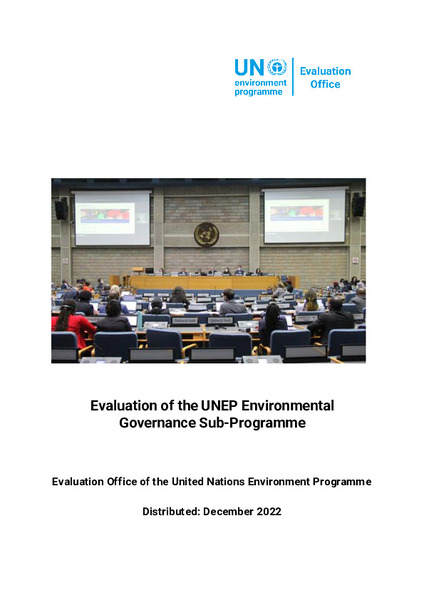| dc.contributor | Evaluation Office | en_US |
| dc.contributor.author | Evaluation Office of UNEP | en_US |
| dc.contributor.other | Lucks, Dorothy | en_US |
| dc.contributor.other | Johnston, Sam | en_US |
| dc.date.accessioned | 2023-01-06T07:00:48Z | |
| dc.date.available | 2023-01-06T07:00:48Z | |
| dc.date.issued | 2022-12 | |
| dc.identifier.uri | https://wedocs.unep.org/20.500.11822/41594 | |
| dc.description | This evaluation assessed the Sub-Programme on Environmental Governance (SPEG) of the United Nations Environment Programme (UNEP) over the period 2014-2021. The evaluation contributes to accountability and learning objectives to inform future planning and programming.
The SPEG is one of seven UNEP sub-programmes. The SPEG has consistently targeted three areas over the evaluation period, i) a normative approach focused on preparing and developing laws and standards, ii) supporting and striving for coherence of global environmental governance with Multilateral Environment Agreements (MEAs), the Sustainable Development Goals (SDGs) and the United Nations system; and iii) supporting active environmental governance capacity building within UNEP, more broadly within the UN system and also across Member States. In UNEP’s latest strategies, the SPEG is recognized as a foundational sub-programme that is an important contributor to activities and results of other sub-programmes and that aims to support the thematic sub-programmes.
The evaluation addressed identified key evaluation questions and followed internationally recognized evaluation criteria of relevance, effectiveness, efficiency, sustainability and impact as well as the UNEP-specific criteria of factors affecting performance and cross-cutting issues including gender and human rights mainstreaming and impacts on vulnerable groups to guide the assessment. The evaluation analyzed evidence from three data sources, i) review of relevant strategic and operational documents, ii) the Project portfolio through a sample selection and analysis of available evaluation ratings, and iii) interviews with key stakeholders. | en_US |
| dc.language | English | en_US |
| dc.rights | Public | en_US |
| dc.subject.classification | Environmental Governance | en_US |
| dc.title | Evaluation of the UNEP Environmental Governance Sub-Programme, 2014-2021 | en_US |
| dc.type | Subprogramme Evaluations | en_US |
| wd.coverage.region | Global | en_US |
| wd.identifier.website | https://unep.org/evaluation-office | en_US |
| wd.subject.keywords | environmental governance | en_US |
| wd.subject.keywords | multilateral environmental agreements | en_US |
| wd.subject.keywords | foundational sub-programme | en_US |
| wd.subject.keywords | capacity building | en_US |
| wd.subject.keywords | legal support | en_US |
| wd.subject.keywords | international cooperation | en_US |
| wd.subject.keywords | national policy development | en_US |
| wd.identifier.sdg | SDG 6 - Clean Water and Sanitation | en_US |
| wd.identifier.sdg | SDG 8 - Good Jobs and Economic Growth | en_US |
| wd.identifier.sdg | SDG 12 - Responsible Consumption and Production | en_US |
| wd.identifier.sdg | SDG 14 - Life Below Water | en_US |
| wd.identifier.sdg | SDG 15 - Life on Land | en_US |
| wd.identifier.sdg | SDG 17 - Partnerships | en_US |


